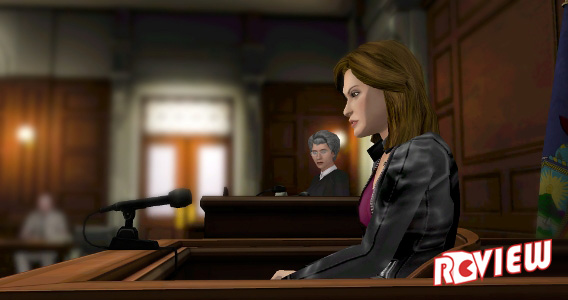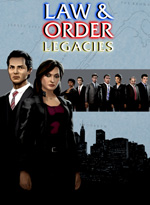
I’ve never really thought about it, but I have watched a lot of Law & Order. I wouldn’t call myself a diehard fan – I certainly don’t follow it with the same fervor that I do Fringe or Doctor Who – but I have probably caught hundreds of episodes of the show and its myriad spin-offs while searching the channels for some decent background noise.
It’s great comfort TV – often extremely clever, but at the same time, extremely structured. You know what to expect from the show; there’ll be a few witty cast members, a bit of mystery, and an interesting case that will be wrapped up within the hour (organized in such a manner that the first half will consist of the police investigation, while the second half will focus on the prosecution as they make their case in the courtroom). In fact, it’s a formula that seems to slot quite well into Telltale’s episodic game structure.
Even with a format perfect for a game adaptation, I would not in a million years have expected the Law & Order license to produce a good game. While flawed in several ways, by dropping many of the adventure game tropes that you expect from the studio and borrowing bits and pieces from the similarly themed LA Noire and Phoenix Wright, Telltale Games has produced an intriguing title that perfectly captures the spirit and conventions of its licensed material.

Like the television show, each episode of Law & Order: Legacies is broken up into “law” (police) and “order” (courtroom) sections, and each of those can be divided up into a series of corresponding minigames interspersed between cutscenes.
The meat of the police section is the interrogation of witnesses and suspects. During these segments, you’ll ask questions and listen to your subject’s responses. If they tell a lie, or if you spot any sort of inaccuracy, you will be presented with a chance to press for more detail and present evidence that contradicts their statement. Instead of presenting physical pieces of evidence, like you might in Phoenix Wright, you instead tend to point out logical fallacies or direct lies by relating to previous statements. This is largely a test of your memory, but if you’re like me and have roughly the memory of a goldfish, you can bring up a log of all previous conversations at any time. These interrogations tend to be incredibly simple, and you can usually spot the lies (and point out the truth) with ease. The answer options usually include one obvious response, one that is close but just slightly off, and two that are obvious jokes (though, I will give them credit – they tend to be pretty clever jokes). However, despite their relative ease, these segments often get pretty tense, and some of the back and forth between the cops and the suspect is really fun.

The other minigame that you’ll encounter during the police investigations is a crime scene examination. This comes in the form of a hidden-object game, where you have to circle each of the items that you’ve been sent to find. These objects are hidden amongst a number of similar objects (or under conspicuously placed towels or boxes), and you’ll have to be careful to select the right one. Again, this game is pretty easy – you are provided with outlines of most of the items that you’re searching for (though, they do mark a few as question marks to add a little bit of a challenge).
The controls for these segments can be a bit frustrating, however. Moving the mouse toward the edge of the screen simply moves a fixed camera along a track, and there were a number of times where I really just wanted full control over my viewpoint and level of zoom. Additionally, you have to physically draw a circle around an object instead of just clicking on it. When an object is small, this gets a bit tricky – you may have to draw your circle a few times just to get it to recognize what you’re looking for. This was a case where it was clear that this game was designed for the iPad, and controls that work well on a touchscreen don’t always translate to a mouse.

Courtroom cross-examinations play out quite similarly to the interrogations conducted during the police scenes. You’ll press holes in witness testimony and look out for lies from the accused, then present evidence that contradicts their claims. The key gameplay difference comes into play when the defense attorney takes over. You are given the option to raise an objection after every question posed to a subject, and if you do object, you have to specify what exact rule was violated. These tend to be things like asking the subject leading questions to get specific answers out of them, or pointing out that the defense is deliberately trying to get a reaction from the jury. You’ll also point out when subjects are asked to give expert testimony on a topic that they are not well-versed in, as well as other similar infractions.
Like the interrogations, the cross-examinations are a lot of fun and can occasionally be incredibly tense, especially given that somewhat more is on the line this time. As the case progresses, a meter will fill or shrink in response to the actions taken by the prosecution and defense, representing which side the jury favors. If you take the lead and fill this meter, you’ll be able to press for not just the guilty verdict, but also a stronger prison sentence. If the meter is too low, the criminal might get off with a minor slap on the wrist.

It is blatantly obvious that Law & Order: Legacies was designed first and foremost as an iPad game. This comes through most clearly in the gameplay design choices. You never directly control a character – game interaction instead comes in the form of clicking menu options and drawing circles around objects. However, the iPadness of the design (if you’ll forgive my lack of a better phrase) can be felt at every level, from the Apple-style toggles and button styling to the low-polygon graphics engine. In general, the fact that this is an iPad game ported to the PC isn’t a bad thing – it just feels a bit limiting. I couldn’t help but lust after a few of the improvements that could have come from small changes to the PC port, things like better control options during the crime scene investigations.
My reaction to the graphics in Law & Order Legacies is a bit mixed. Telltale’s internal engine was designed to work well on lower-end machines, so the company tends to stick to cartoon-like renderings. That style works well for humorous games like Sam & Max or Monkey Island, but when combined with the more serious themes of Law & Order, it often just doesn’t mesh well at all. When I was wrapped up in the storyline, the art generally didn’t bother me, but it can be pretty jarring when the camera cuts to a crudely rendered cell-shaded corpse. On the other hand – I’d almost rather they stick to the cartoony designs over attempting to realistically depict people on a game designed for the iPad. So, mixed feelings overall, but the art style works most of the time, and I’d rather they stick to cell-shading if the game is ultimately designed for a portable device.
Telltale is known for their great writing, and Law & Order is no exception. The cases featured in each episode are fairly gripping, and have some great twists and turns. The characters (both the interrogators and interrogatees) have great dialogue, and some of the responses that you can choose during conversations are downright hilarious. The subject matter of the cases fit the general atmosphere of the show well, and are actually fairly topical. For instance, the first case is a thinly-veiled retelling of the recent News Corp phone hacking scandal (with an added sex abuse tie-in and a hacker who demands that you call him “Anonymous”). The voice acting is fitting, and while you can tell that they used sound-alikes rather than the actual cast members, the voices are close enough that it isn’t distracting.

Playing Law & Order: Legacies doesn’t really feel like you’re playing a game. It feels like you’re interacting with an episode of a television show. While playing a game is – almost by definition – interacting with a video feed, there is absolutely a difference between playing something like LA Noire and completing an episode of Law & Order. In some ways, Law & Order is more of a “choose your own adventure” story, where your mistakes can cause the story to branch in slightly different directions.
Mind you, this isn’t entirely a bad thing. The individual episodes of Law & Order: Legacies are gripping, fast-paced stories that pull you along for a ride that lasts about exactly as long as an episode of the show that the series is licensed from. While annoyingly easy at times, the individual minigames are very fun, and winning over the jury in the courtroom can be a pretty stressful affair. By trimming the fat from the game, Law & Order is left with nothing but the core of each case, and in many ways, the choice to drop some of the more “gamey” bits of a typical adventure game was the best decision that Telltale could have made. I ended up having more fun with Law & Order than I did with many of the individual cases in LA Noire simply because I didn’t have to spend half an hour driving around a massive world. I could dive straight into the investigation.
Law & Order: Legacies will be primarily of interest to fans of the long-running television franchise, and those fans will absolutely be thrilled with the final product. It’s a well-written set of interactive episodes of the show, and is ripe with familiar characters and other treats for that audience. However, this isn’t entirely a fans-only affair. Anybody looking for a pesudo Phoenix Wright experience should consider giving Law & Order a try. It’s not without its warts, but I was surprised by how much I ended up enjoying the ride.
Telltale Games
Publisher
Telltale Games
System
PC, Mac, iOS (Mac Reviewed)
Modes
Singleplayer
Release Date
January 26, 2012
*A copy of this title was provided by the publisher for review

Now to wait for it to be released on PSN. Shouldn’t be more than a month or twelve.
Comment by EdEN — February 2, 2012 @ 8:03 pm
Thanks for the review Greg. I never thought I’d be saying this, but I may recommend this on iOS to my mother.
Comment by Jamie Love — February 2, 2012 @ 8:37 pm
Hahaha, you recommended Unpleasant Horse to her? I can only imagine the look on her face after booting the game up.
Comment by EdEN — February 3, 2012 @ 4:26 pm